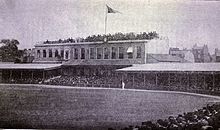|
1882 FA Cup final
The 1882 FA Cup final was contested by Old Etonians and Blackburn Rovers at the Kennington Oval. Old Etonians won 1–0, the only goal scored, according to most reports, by William Anderson,[1] although another, questionably, gives Reginald Macaulay. It was the last final to be won by one of the Southern "gentleman amateur" teams who had dominated the first decade of the competition. Summary In the final, played at Kennington Oval on 25 March 1882, the Old Etonians met Blackburn Rovers, who were the first team from outside London and the Home counties to appear in an FA Cup final. Blackburn included England internationals, Fred Hargreaves and his brother, John, and Jimmy Brown. Owing to the clash of the club's regular colours, Rovers wore "something very much like" the Darwen hoops[2] in dark blue and white, while the Etonians wore their light blue and white colours in a "harlequin" (i.e. quartered) design.[3] The Old Boys dominated the early stages of the match but Rovers defended well until, according to the match report in Gibbons' "Association Football in Victorian England", "following an expert through ball by Dunn, Macaulay steered the ball between the Blackburn goalposts to secure a well-deserved half-time lead".[4] However, a tribute in The Times (1937) states Macaulay was fond of recalling he outpaced the Blackburn players and helped towards the goal, without claiming to have scored it. Other reports identify the scorer differently: Bell's Life in London, The Field and The Times stated it was Anderson, the first two detailing the ball had been successively passed to him by Macaulay and Dunn, while The Sporting Life stated the ball was centred "to the front of the posts" by Novelli before it was kicked "out of a brief and loose bully" (i.e. a scrimmage) by an unnamed player.[5] Also varied is the time at which the goal was reportedly scored: eight minutes from the start by Bell's Life, ten minutes by The Sportsman, and "a quarter of an hour's play" by The Sporting Life.[6] The Old Etonians were able to prevent Blackburn from scoring in the second half, thus claiming the cup for the second time in three years. Match details
AftermathIn May 2013 a programme from the game sold at auction at Sotheby's for £35,250, a world record for a football programme.[7] Bibliography
References
|
||||||||||||||||||||||||||||||||||||||||||||||||||||||||||||
